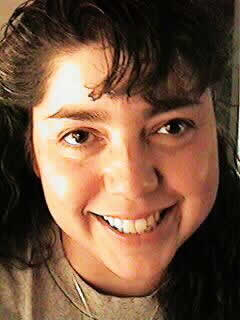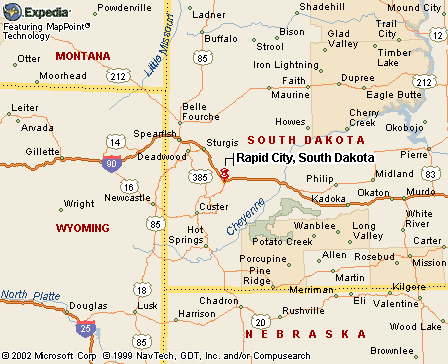|
|
Canku Ota |
|
|
(Many Paths) |
||
|
An Online Newsletter Celebrating Native America |
||
|
June 19, 2004 - Issue 115 |
||
|
|
||
|
Choices Bring Change |
||
|
by Heidi Bell Gease, Rapid City Journal Staff Writer |
||
|
credits: Dani Daugherty |
||
|
editor's note: We enjoy spreading good news, in the hope that someone will find inspiration ... It is especially pleasing when the subject of that good news is a friend. Way to go, Dani. |
|
RAPID CITY -- Life is good for Dani Daugherty.
She is also happily married, with four daughters. Yet if not for a few simple choices along the way, Daugherty's life might be very different today. Eight years ago, she was newly divorced, a single mother scraping by on a meager salary. She had a high school diploma and a trailer house on Pine Ridge Indian Reservation. But Daugherty also had a strong incentive to improve her life: Her daughter, who was then 6 years old. "Amanda was what really clarified things for me, that ‘I need to do something different so things are different for this kid,'" she said recently. Daugherty downplays her accomplishments. What she did, she said, was make small lifestyle decisions that paid off. "I don't think it's anything that's giant rocket science," she said. Daugherty, then Dani Fresquez, grew up in Pine Ridge, where her mother was a social worker and her father is an educator. She graduated from Pine Ridge Christian Academy, a small private school near their Wolf Creek home. After high school, she attended South Dakota School of Mines & Technology in Rapid City. But drinking interfered with her studies. She dropped out, moved home and got married. She could have kept partying. She didn't. Instead, she stopped drinking, thinking it would help her marriage. It didn't. Daugherty found herself divorced and raising Amanda alone, trying to make ends meet. She could have gone on welfare. She didn't. Instead, she worked as a grant writer for Red Cloud High School and later for the Lakota Fund. She took a few college courses. Still, she seemed to be treading water. Daugherty could have kept drifting. She didn't. Instead, she concentrated on school, earning a bachelor's degree from Oglala Lakota College in 2000, then tackling law school at the University of South Dakota. An attorney whom Daugherty had met once told her she would make a great lawyer. Daugherty remembered that when she found a USD program that allows students to earn a joint degree in public administration and law in three years. "Once I saw that opportunity at USD, I thought, ‘That's it,'" she said. "But it took a big leap to sell my single-wide trailer that I was so proud of." It was also a big leap for Amanda, who turned 9 when they moved to Vermillion. Both adapted well — though Daugherty wasn't so sure at first. "I don't think anybody can explain to you how bad (law school) is going to be until you get there and start doing it," she said. "The first year was hideous." Law school professors give huge reading assignments, plus lectures. Daugherty tried to do all her studying between classes and after Amanda was asleep. In class, professors often call on individual students to answer questions. "Dani was one of those students who, if you wanted to get on with the class by getting the right answer, you called on her," Barry Vickrey, dean of the USD School of Law, said. Daugherty didn't know that then. And the worst part was that semester grades are based entirely on one three-hour essay exam — and test results don't come back until the next semester has already started. Daugherty remembers stuffing her report card in her backpack and taking it home before opening it. "I just couldn't even look at it," she said. "But it was a lot better than I ever imagined." She had earned A's and B's. Daugherty thought, "I can do better than that" — then realized she was in the top five students in a class of about 75. "You just have to adjust to lower standards," she said. She didn't do that in her personal life. On Jan. 1, 2001, she married Steve Daugherty, a Huron farmer who has commuted to plant and harvest his crops ever since. "I thought, 'I'd better marry a farmer, in case this doesn't pan out,'" she said jokingly. (Incidentally, Daugherty's sense of humor is one thing people remember about her. At Pine Ridge, she was renowned for her "Top 10" lists, one of which won her tickets to "The Phantom Menace" Star Wars premier in a 1999 Rapid City Journal contest.) During law school, Daugherty did an "externship" with the U.S. Attorney's Office in Sioux Falls. She was a graduate assistant, teaching review classes and publishing a newsletter. She worked on USD's Law Review, earning the prestigious editor-in-chief position. As far as she knows, she is the first Indian editor-in-chief of any U.S. school's primary law review. The Daughertys were also named USD's "Family of the Year" in 2002. And that fall, Dani and Steve took in Lenora, a young relative who needed a home. They have since adopted "Nora," as she's called, who is now 5. How does a person manage all that? "I'm very organized," Daugherty explained. "I just blocked time to do things and just made it work." She is still doing that. Daugherty was among 100 law students to apply for a clerkship with U.S. District Judge Karen E. Schreier. She got the job, which started in August 2003, days after she had taken the bar exam — and less than two months before giving birth to a daughter, Madison. Luckily, Daugherty said, Steve is "Mr. Mom when he's not farming. He took over when Madison was 6 weeks old." Their family grew again last November, when the Daughertys took in foster daughter Catherine, 17. She has stayed with them longer than with anyone else, Daugherty said. Federal clerks spend two years working for a judge, researching legal issues, preparing drafts of opinions, drafting jury instructions and handling other paperwork. Schreier believes clerkships make better lawyers. They also help her do her job. "They're able to go through a record in great detail and flag the really significant parts that I need to pay very close attention to," the judge said. "It's really important to have good law clerks. ... (Dani) has been terrific." For Schreier, it's an added bonus to have a clerk from Pine Ridge. Because the federal court in Rapid City handles all felony cases from Pine Ridge Indian Reservation, about 60 percent of the caseload in Rapid City's federal court is American Indian. "One of the comments that I've heard a lot from both defendants and witnesses, and Native American jurors, is that for them, coming into the federal system is frightening," Schreier said. "They come into the courtroom, and there are not any other faces ... of people of color." Daugherty's presence has helped people feel more comfortable in court, Schreier said. "That has been just a tremendous benefit, I think, to the federal court system in general." Daugherty's background has helped in other ways. For example, she wrote an informational memo for a case involving the Badlands, including a paragraph explaining the significance of the Stronghold area to the Lakota people. An assistant U.S. attorney told her later that the information was very helpful and likely wouldn't have been included if Daugherty hadn't written it. Daugherty downplays the significance of being the first Indian law clerk in South Dakota's federal system. With more Indian students entering law school, it was bound to happen soon, she says, and she is glad for that. "I think we're starting to see a lot of firsts fall away at this time," Daugherty said. Her clerkship is less shocking now than it might have been 15 years ago, "and that's exciting to me." One of her USD classmates, Shane Thin Elk, is now a clerk for the chief justice of the South Dakota Supreme Court. They were among six Indian students in Daugherty's class who completed law school. That was twice as many as any previous USD law class. People such as Barry Vickrey hope Daugherty might help inspire other Indian students to follow her lead. "I think it is important for people to see what Dani has accomplished," Vickrey said. "I would like to think a young Native American student would read (this) story and be inspired to think, ‘I can be the best I can be, as well.'" Daugherty expects to eventually work in a tribal setting and hopes to someday teach law school. She doesn't know what she will do when her clerkship ends in 2005, although she has promised her husband they will move closer to Huron. Daugherty could be worried. She isn't. So far, when her life has been at a crossroads, opportunities have presented themselves; and she has taken advantage of them. "It's been working very well for me so far," she said with a smile. |
|
|
www.expedia.com |
|
|
||
|
|
||
| Canku Ota is a free Newsletter celebrating Native America, its traditions and accomplishments . We do not provide subscriber or visitor names to anyone. Some articles presented in Canku Ota may contain copyright material. We have received appropriate permissions for republishing any articles. Material appearing here is distributed without profit or monetary gain to those who have expressed an interest. This is in accordance with Title 17 U.S.C. Section 107. | ||
|
Canku Ota is a copyright © 2000, 2001, 2002, 2003, 2004 of Vicki Barry and Paul Barry. |
||
 |
 |
|
|
The "Canku Ota - A Newsletter Celebrating Native America" web site and its design is the |
||
|
Copyright © 1999, 2000, 2001, 2002, 2003, 2004 of Paul C. Barry. |
||
|
All Rights Reserved. |
||
 A
2003 law school graduate, she is currently a federal law clerk —
the first American Indian to hold that job in South Dakota.
A
2003 law school graduate, she is currently a federal law clerk —
the first American Indian to hold that job in South Dakota.